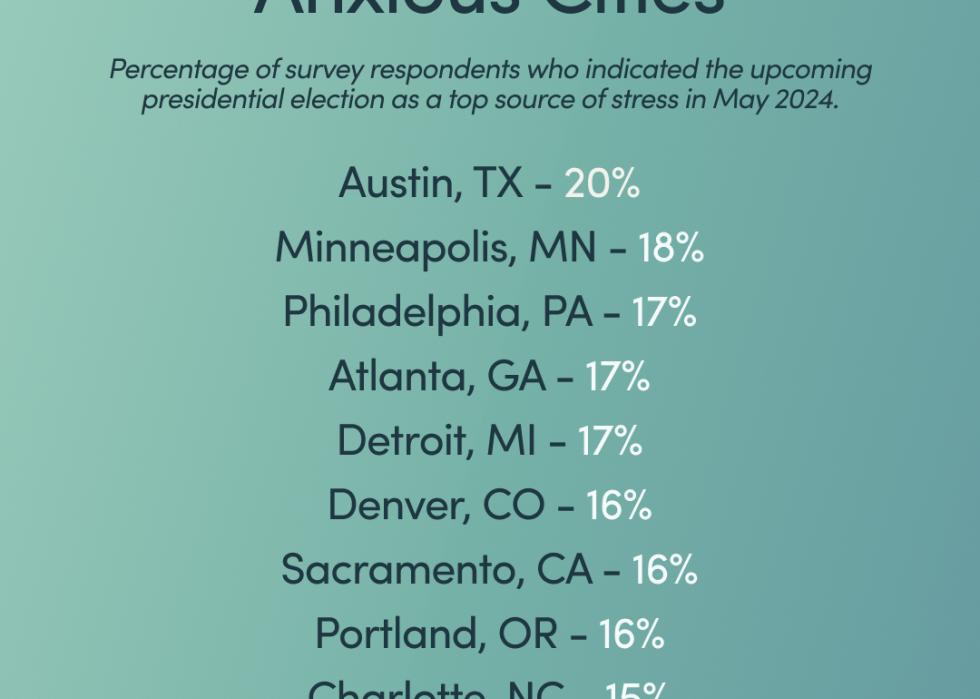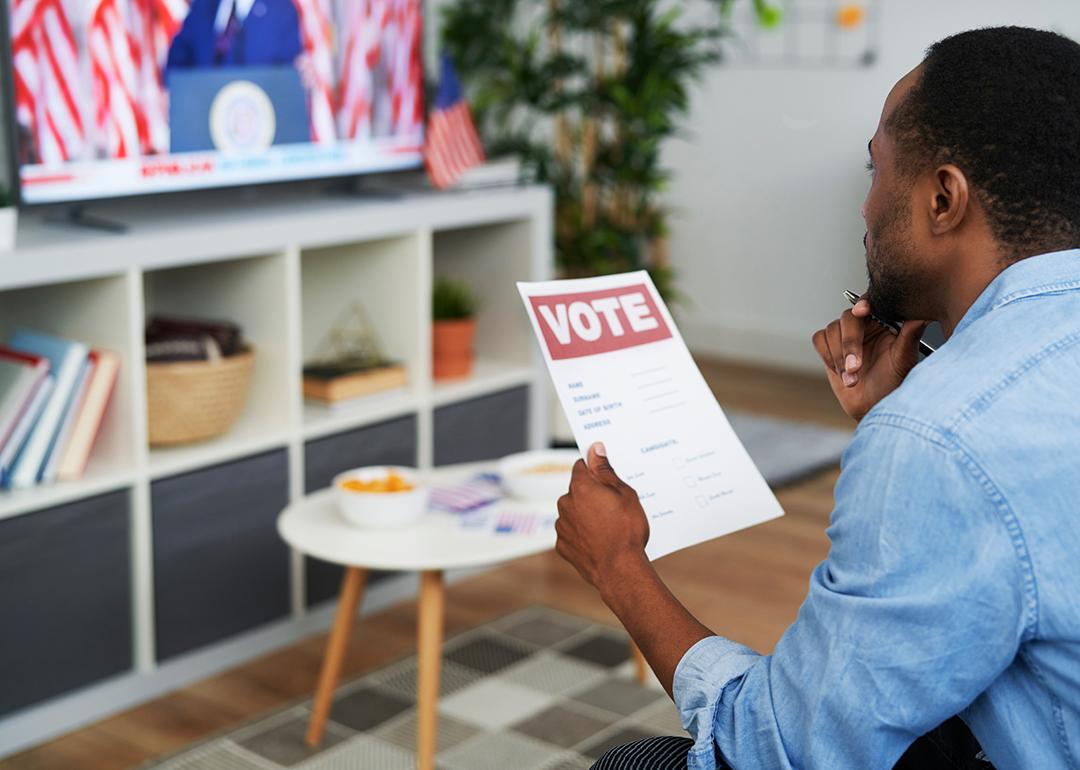How stressed are American cities about the election? Plus, election anxiety tips from a psychologist

Percentage of survey respondents who indicated the upcoming presidential election as a top source of stress
- Austin, TX - 20%
- Minneapolis, MN - 18%
- Philadelphia, PA - 17%
- Atlanta, GA - 17%
- Detroit, MI - 17%
- Denver, CO - 16%
- Sacramento, CA - 16%
- Portland, OR - 16%
- Charlotte, NC - 15%
- Salt Lake City, UT - 15%
- New Haven, CT - 14%
- Nashville, TN - 14%
- Greenville, SC - 14%
- Houston, TX - 13%
- Los Angeles, CA - 13%
- Las Vegas, NV - 13%
- Orlando, FL - 12%
- Little Rock, AR - 12%
- Honolulu, HI - 12%
- St. Louis, MO - 12%
- Omaha, NE - 12%
- New York, NY - 11%
- Tampa, FL - 11%
- Oklahoma City, OK - 11%
- San Francisco, CA - 11%
- Seattle, WA - 11%
- Des Moines, IA - 11%
- Boston, MA - 10%
- Pittsburgh, PA - 10%
- Miami, FL - 10%
- Raleigh, NC - 10%
- San Antonio, TX - 10%
- Norfolk, VA - 10%
- San Diego, CA - 10%
- Albuquerque, NM - 10%
- Cleveland, OH - 10%
- Providence, RI - 9%
- Memphis, TN - 9%
- Phoenix, AZ - 9%
- Chicago, IL - 9%
- Kansas City, KS - 9%
- Milwaukee, WI - 9%
- Baltimore, MD - 8%
- New Orleans, LA - 8%
- Columbus, OH - 8%
- Dallas, TX - 7%
- Washington, DC - 7%
- Louisville, KY - 7%
- Indianapolis, IN - 6%
- Birmingham, AL - 3%
Tips for Keeping Political Anxiety at Bay
While stress levels by city may have shifted since May, what Republicans, Democrats, and Independents all might agree on—other than their health, a story Hers reported on in July—is that this election cycle has been a rollercoaster. Here are some tips for keeping calm and carrying on through the fall.
- Practice mindfulness. Practicing mindfulness involves breathing methods, guided imagery, and other practices to relax the body and mind to help reduce stress. Recent research shows mindfulness meditation may be as effective at reducing anxiety as medication for some people.
- Try stimulus control. Stimulus control is a behavioral psychology technique in which a stimulus that typically triggers a certain behavior is modified so that the behavior is less likely to occur. You might find that your political anxiety increases when reading the news, listening to the radio, or scrolling through social media. Try setting limits around content consumption to keep this anxiety at bay.
- Talk it out. Research proves that simply naming your feelings can help calm you down. Saying "I'm anxious/agitated/restless" helps build insight into what you're feeling and why you're feeling it. And once you're more aware of the distress you're feeling, you're more likely to do something to manage your anxiety and stress.
- Head to the polls. If you're feeling stressed about the election, make a plan to vote. No matter which candidate you support, being civically engaged may help you feel personally fulfilled and alleviate psychological distress. According to research, civic engagement can have a positive impact on mental health. Voting allows people to weigh in on processes and policies that are bound to affect the society they live in. And activism has been linked to happiness, personal fulfillment, and social well-being.
- Remember radical acceptance. If you try all of the above and still find yourself in distress over the politics of our nation, it might be time to consider practicing a dialectical behavior therapy skill called radical acceptance. Radical acceptance means acknowledging and even embracing difficult circumstances—and understanding that we cannot always control them. Doing so is intended to help reduce emotional suffering.
Data and Methodology
This study is based on a 5,504-person online survey, which included 5,000 18-to-65-year-old respondents in the top 50 metropolitan areas (100 respondents per city) and a nationally representative sample of 504 18-to-65-year-old respondents to contextualize results. The study was fielded in May 2024.
Findings were analyzed by more than 100 demographic and psychographic cuts, including city, region, gender (when Hers refers to "women" and "men," this includes all people who self-identify as such), age, race and ethnicity, relationship status, parenting status, sexual orientation (heterosexual, bisexual, gay, lesbian, pansexual, asexual, queer, etc.), and political affiliation, among other areas of interest.
Metropolitan populations were determined by 2022 Census data. In order to represent as many states as possible within the study, five cities that did not fall in the top 50 metropolitan locations were selected in place of cities in states already represented. Cities added to the study included New Orleans, LA (51), Providence, RI (53), Little Rock, AR (59), Honolulu, HI (68), and Omaha, NE (71). Cities replaced in the study included West Palm Beach, FL (39), Jacksonville, FL (41), Grand Rapids, MI (42), Harrisburg, PA (44), and Greensboro, NC (45).
Respondents were asked to rate their happiness on a one to five scale. To rank the happiest cities in America, Hers looked at the number of respondents who rated themselves as a four (happy describes me) or five (happy very much describes me) to create an average happiness score.
All data in this study are from this source, unless otherwise noted. Independent research firm Culture Co-op conducted and analyzed research and findings.
